Author Archives: TJ
Author Archives: TJ

Finally! You’ve found the cure to your depression!
You read about something new and you just feel it in your bones.
You’ve tried it all already and you know this should do the trick!
But then it might work for a moment, and you find yourself right where you started.
You’re still stuck in crippling depression and that’s when it hits you.
You’re doomed and there is nothing you can do.
You’ve relapsed over and over and over and nothing has worked. You then think, “Depression is forever.”
It doesn’t help that the societal norm is to believe depression is a disease and that you have to take pills like a “diabetic has to take insulin.”
Psychiatrists told me that all the time. I was told that my depression was so bad that I would have to take antidepressants for the rest of my life.
What do you think doctors would say if I told them that I fixed my diet, corrected nutritional deficiencies, restored my brain using amino acids instead of having to take Celexa, and when the root causes were fixed my depression was gone?
They would probably just write me off as a random recovery case.
The thing is, by its very definition, depression makes you think that depression is forever.
Depression places a “filter” over your thoughts. I know that even as I am writing this, a lot of this isn’t going to register until you finally feel better.
This filter produces all-or-nothing thoughts. Many of which are simply not based in reality.
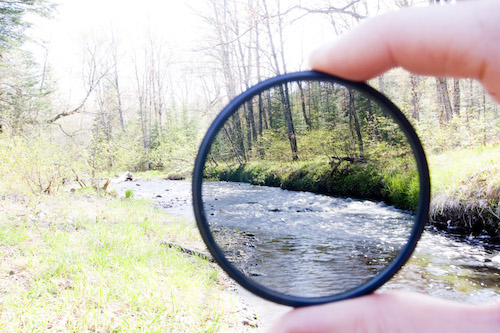
When depressed, everything you see looks different
Since you are depressed, you can only see the supporting reasons why depression is forever. This is how depression creates a downward spiral and feeds itself. Some people don’t even believe me when I say I had depression for 11 years and now I don’t. I also understand exactly why they don’t believe me, because when I was depressed I wouldn’t believe that either.
Here’s the simple truth. People are recovering from depression all the time. You just have the “filter” over your thoughts. You most likely read depressing stories online. Whenever you search about depression you see horror story after horror story. When you search about people getting off of antidepressants you really see horror stories.
Other than having the “filter” that depression causes to your thoughts, there are two main reasons why we don’t remember or see the success stories.
The first reason why there is an abundance of negative stories when it comes to healing from depression is that the brain will focus on negative events instead of positive events.
Have you ever watched the news? What do they report on? Do they ever say, “In the east part of town, three teenagers started a fund and rescued a group of dogs that are now happy in new homes?” Never, because that isn’t what the brain responds to. People would watch the news channels that showed car accidents and wars and the happy news channel would quickly go out of business.
Why is that?
For survival reasons, our brains are impacted more by negative events and things rather than positive ones. This is because it is better for survival to remember that someone died by a lion next to the river than it is to remember that there were pretty flowers by the lake.

Would you rather remember where the flowers are, or avoid this situation?
Our brains focus on the negative and get stimulated by them because that helped us survive as a species.
This makes it even harder for people with depression (who have “the filter”) to see that people are healing from depression. It is more memorable to see all the hopeless stories on forums.
That’s why when Robin Williams died, everyone emailed me saying that if he had that much money and fame and still committed suicide, that meant that they had no hope to recover.
The truth is, it’s probably harder to deal with life when you have fame like he did. Not to mention I fixed my depression when I was completely broke. Robin Williams was also just one man (and they are now saying he had a rare brain disease on top of all this), yet seeing this one well-known man commit suicide makes it seem like it is impossible to heal from depression.
Our brains see the death of someone like Robin Williams and is highly impacted by it despite the thousands of others that are healing their depression while you read this post.
The second reason that you don’t hear about as many positive stories is that people will post all day about their pain when they are in depression, but when they fix it they just go on with their lives and they don’t want everyone to know that they were depressed.
I have a lot of people take my program or use my site and email me telling me that they are better now and are excited to be living life.
A lot of these people I will never hear from them again. The ones that I email asking if they would like to write a success story usually don’t want to go public about having experienced depression.
This causes a lot of the success stories to go unnoticed. Some people get major depression and largely keep it a secret, fix it, and then go on living their lives and don’t look back. Others don’t want to put their name out there on the internet and want to keep their anonymity.
It makes sense for a lot of people that once they fix their depression they get to move on and not think about it anymore.
When I first started working with people and created this site, it was hard for me thinking about my own depression. I’ve done it long enough now that someone can email me in a really bad condition, I can help them in the best way possible, and I can do that without starting to feel what they feel.
The truth is, success stories are out there. I get emails from people all the time about them healing from depression. I get private Facebook messages from people telling me they were depressed for years and then finally figure it out. At the beginning of my Start Here page I have several success stories posted from people that just visited my site and were willing to put their stories out there.
Hundreds of people are healing from their depression right now. They just don’t want to go out telling the whole world about their dark past.
If it isn’t forever, how long depression last?
People also ask me how long it will take until they feel better and aren’t depressed anymore.
The answer is that it depends.
I’ve seen some people heal themselves in a matter of weeks. I’ve seen some people take a year to just for the withdrawal effects from Nardil wear off.
How long depression will actually last all depends on how severe your root causes are and how long it will take to fix them.
Someone that simply has a vitamin d deficiency can fix their depression very quickly whereas someone with SIBO, parasites, low thyroid, Epstein-Barr virus infection, and allergies to food will take longer.
The thing is, even if it does take you a year or two to fully recover, it can still be done.
Here’s the truth. Depression can be fixed. Thousands of people are doing it everyday. Depression is caused by something. You just have to find the root causes for your depression and fix them.
But let’s just pretend that maybe depression can be forever. What if it isn’t always fixable?
Either way, if you have depression, you have two options. You can either keep testing, trying new things, and going until you succeed. Or you can give up and accept your circumstances and never feel good again.
I don’t know about you, but even if it took me 10 years to figure it out, it would still be worth it.
Depression makes it really hard to do anything. I remember at times it was almost impossible to even just brush my teeth.
The most powerful thing I ever did, was tell myself I was going to go all out for a year and try everything, do anything, and test any approach until I found the answer.
Even if it was the smallest baby step forward, I would do it. I had to. I had no other choice. I either figure out my depression or I would die trying.
You can either keep moving forwards and trying new things, or give up. The choice is yours.
But we all know that as long as you don’t give up, things will get better, regardless of how long it takes.
The biggest lie depression tells you, is that it is forever.
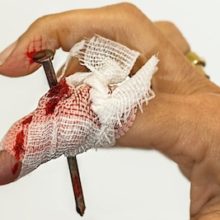
One of the reasons I was able to beat my depression is I stayed away from depression support groups.
Sounds kind of odd, right?
Shouldn’t depression support groups, well, help?
Don’t get me wrong, you should get as much support as you possibly can.
However, depression support groups often will keep you depressed rather than actually help you fix the problem.
One time I felt like giving back, so I logged into a depression support group on Facebook.
I posted about how I had beaten depression and I wanted to help others. I posted for them to ask me any question they wanted.
I didn’t mention I had a website and I didn’t mention anything promotional. All I said was that I had overcome depression and I wanted to answer people’s questions.
My post got deleted.
What the hell?
Here I am, trying to simply help everyone, and my post got deleted.
I went through the group some more and everyone was just complaining.
Here is an example:
“U know what really annoying? When ur hubby comes back from being on the road. And all he does is on the phone text and more texts. Am I really that boring ? Maybe u should just not come home at all !!!
Ahhhhhh ok end rant. No wonder I’m so dam depressed half of the time.”
“Why don’t you just ask him ‘Am I so boring that you have to play with your phone instead of talking to me?’!”“That’s rude I would plain ask him what’s so much more important on there then me!!??”
As you can see, I doubt those strategies will build a connection between the two people.
Here is another example of trying to help someone:
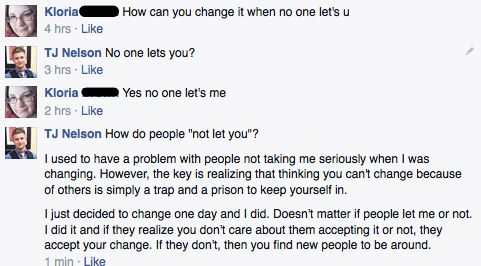
Everyone else was commenting and telling her how unfortunate she must be, how her partners and friends must be all assholes, and how the world sucks and it is horrible that we live in it.
This kind of group keeps people depressed because it reinforces the payoffs for being depressed. Payoffs can be anything from attention, sympathy, company, feeling of being right or justified, etc.
If people are coming on there and getting benefits from being depressed and not moving forwards the group will keep them stuck.
It can also be the blind leading the blind. Would you join a group about how to learn to become a millionaire and the only people in it were people that were broke and in debt?
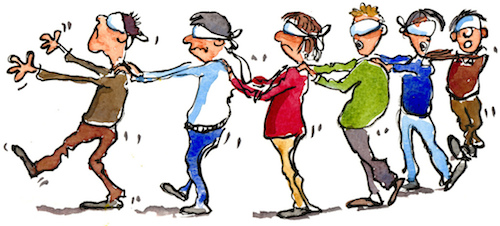
I never really got much benefit from going to depression support groups. It was a bit similar to the Facebook groups and online communities except, just a little less extreme. A lot of them were also based on using medication, and after having my experience with Celexa and having a hell of a time to get off antidepressants, the advice wasn’t helpful either.
The problem with these groups is they focus on the depression like it is a disease and something to just be managed. People go on there and simply vent (which can be relieving in healthy forms) and get validation for staying stuck.
This creates a constant loop and the same people are probably still depressed a year or two later.
It would be like going to a support group for a nail being stuck in your finger and everyone sitting there talking about what painkiller to take and how it sucks instead of how to actually fix the wound.
Chris Kresser likes to describe fixing anxiety or depression as if you have a rock in your shoe and it hurts. You can take a strong painkiller like Advil to reduce the pain, which can help in the short-term. Or you can take your shoe off and dump the rock out, and that is what we are really after when we want to fix depression.
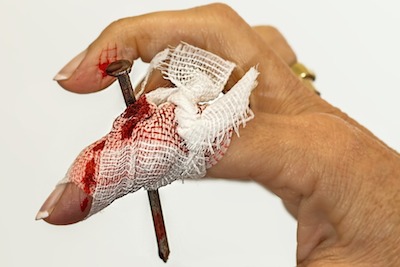
What Advice Would You Give This Person?
I understand why depression groups exist and are the way they are. It is because there is massive confusion in our society about what depression actually really is. People think depression is a disease and can’t be fixed, instead of realizing that depression is a symptom of something else. People think that having depression means that there is something wrong with them. In reality, you have to find your root causes for depression and then fix those. When you do, the depression fades.
For example, when I was living in Thailand and Vietnam I got severe food poisoning and it completely wrecked my gut, and I probably had a parasite also (do NOT just eat all the street food you want over there).
All a sudden, after having already fixed my depression, I started feeling depressed and had severe brain fog, confusion, and anxiety. All the same symptoms came back, but this time it was from a completely different root cause.
I went onto a few gut health support groups to fix the problem and the experience was completely different.
When I was in the depression group, only there to help others, people would say things like, “TJ you couldn’t be any MORE wrong!” and it was hard to have any sort of open minded discussion about the real problem. People didn’t actually want help.
 In the gut health group, people were focusing on the solution. There was some honest venting, but it was almost always like this, “Damn, I woke up this morning and felt extreme nausea. I can barely get out of bed. Anyone else experience this? What should I do?” People then thanked others when they gave advice and reported back after trying it to let us know if it worked.
In the gut health group, people were focusing on the solution. There was some honest venting, but it was almost always like this, “Damn, I woke up this morning and felt extreme nausea. I can barely get out of bed. Anyone else experience this? What should I do?” People then thanked others when they gave advice and reported back after trying it to let us know if it worked.
With depression, everyone is so confused as to what it is that I think people forget that the whole objective is to figure out what is going on with you and then fix it. Depression, by its definition, causes negative and hopeless thoughts, which keeps people in the trap. Depression will cause people to think, “This cannot be solved!” or “There is only two types of depression, circumstantial and that which cannot be cured!” Depression itself feeds these hindering beliefs.
I fell victim to the idea that money was bad, and that paying someone to help me fix my depression was wrong. I just wasn’t able to identify the limiting beliefs I had about investing money into fixing my problem, probably because I was, well, depressed.
It kept me from reading books, trying out therapy, going for the doctor and paying for tests, and anything else that could have helped me escape my misery.
I’m not saying that there are honest money difficulties (I was extremely broke and almost homeless at one point), but we are all spending money one way or another. You have to find a way to redirect that to getting your depression fixed. That’s actually the best investment you could ever make, because not only will you be able to live, but you’ll make more money when you can actually think straight and get out of bed.
People in the gut health support group realized they might need to buy a few supplements or see a doctor to get their issue fixed. The owner of the group created a book to help people that took him a long time to create, and people bought it.
When you are depressed, you tend to think that anything that has a paid option is similar to the devil. Which makes sense, because again, depression itself causes the fear and doubt.
For example, I built a program that helps people diagnose their root causes and then shows you how to fix it. People tell me all the time that I should charge $200-$300 dollars for it, but I just keep it at $97 so that the site can keep functioning and it is enough so that people actually feel focused when they do it (I’ve given it away for free before, and the ones that got it for free didn’t take any action).
I even have a 60 day guarantee on there so that if you do it and there is no improvement you get your money back. This means that you either fix your depression for $97 or you simply get your money back and pay $0.00. Yet people see it as extremely risky.
Even though I have a bunch of posts and emails to help people figure out how to feel better for free, just by having a program that costs money on the site every now and then I will get a hate email from someone even after emailing them for 3-4 weeks helping them for free.
Trust me, there isn’t a lot of money to be made by creating a depression site. I do this to give back and because I’m passionate about it.
The crazy thing about all this, is I used to have all those same negative thoughts. Because I was depressed. That’s why I am writing this post. It’s because I am writing it to my previous self.
And I know how hard it would be to get into the mind of my previous self and actually change the thought patterns. I know how hard it would be to shed light through the brain fog.
I used to think that therapists were messed up for charging money for their time and I never would spend anything on healthy food or any help.
The only thing that changed was my best friend (who was like a family member) died suddenly while I was already in a depression and I was sitting there by myself and just finally said screw it, I’m either going to fix my depression in one year or kill myself.
If that wouldn’t have happened, I might not have been shocked out of the mental trap that I was stuck in.
I wish I would have known that I would make mistakes on the way to beating depression. It is a trial-and-error process. Nobody can tell you with 100% certainty that this or that will do it for you. You have to try it and see.
You don’t know everything about depression. If you are still depressed, then you simply haven’t figured out your depression yet. Otherwise, you wouldn’t be depressed. I fell into this same trap. I immediately would dismiss anything that sounded out of the ordinary or weird. It wasn’t until that moment I told myself that I would either fix my depression in one year or kill myself that I finally had an open mind.
Be solution oriented. Constantly remind yourself that the belief that depression cannot be cured is a symptom of depression itself. There is a way out, but when you are in the depths of depression, it certainly won’t feel like there is. You have to keep going. What other choice do you have?
Get as much support as you possibly can! Just be careful in any group that seems to be a constant cycle of people staying depressed and not being focused on the solution. Aim to figure out what your root causes are, and then work towards fixing those so that you can get out of your depression instead.
Realize that a lot of this is simply because your brain is depressed. By definition, that means that you will have a lot of thoughts that aren’t true and based in reality. Learn to identify that depression can be beat, be willing to do whatever it takes to figure out your own unique root causes, and finally break free of your depression once and for all.

 Most people that find my site are searching for ways to get off their antidepressants.
Most people that find my site are searching for ways to get off their antidepressants.
A lot of these people are searching because they tried to get off and they failed.
Getting off antidepressants can be tricky. It’s best to have a solid game plan to maximize your chances for success. The first time I tried to get off Celexa I failed miserably.
The following is a guest post by Cari Nadeau who had emailed me telling me that she had successfully healed from major depression and anxiety.
Enter Cari:
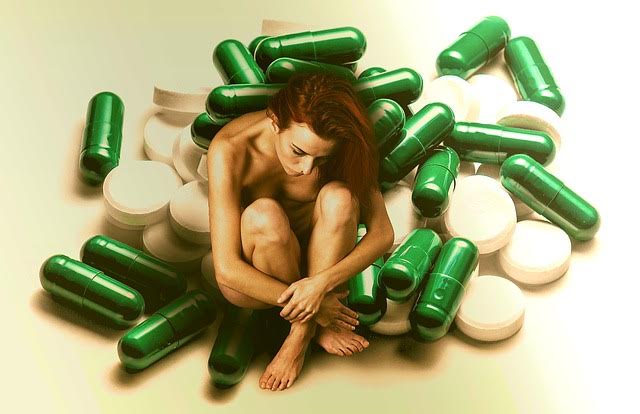
Ask your doctor about getting off of your antidepressant and they will probably tell you to cut down incrementally over a couple of weeks. No preparation, no backup plan, no nutritional fortification. Nothing. This makes me absolutely irate…because then comes the inevitable ‘relapse’ into depression (which is actually drug withdrawal, not depression) and the hopeless feeling that you will be on a drug you don’t want to be on for the rest of your life.
I’ve been there and it’s a horrible experience. Everyone around you just wants you to go back on the drug because they can’t stand to see what you are going through trying to get off of it. They’re afraid you might hurt yourself. YOU’RE afraid you might hurt yourself. No one around you understands that you are actually experiencing drug withdrawal because of the changes the drug has made to your brain.
It doesn’t have to be this way.
Your psychiatrist or MD won’t have the answer to this problem. But Dominate Depression does.
Here are the six things I wish I knew before trying to get off of antidepressants:
Use a compounding pharmacy to help get off your antidepressant slower. Compounding pharmacies are pharmacies that will custom make medicines for you. This enables you to cut down VERY slowly and steadily by TINY doses. If you can’t find one close to you, you can find one to order from online. Your doctor needs to call in the prescription, just like a regular pharmacy. You can also find out if the med you are on is made in a liquid form, which might be available at your regular pharmacy.
Slow and steady wins the race. I’ve seen taper plans that recommend cutting down by 10% at a time, which is infinitely better than the usual 25% at a time your doctor will tell you to do. But, do whatever feels right to you. There’s no rush. The slower you go, the greater your chances of success will be, especially if you have been on antidepressants long term.
Get your diet on track to support maximum healing potential of the body and brain. Avoid the foods that are exacerbating any inflammation or immune dysfunction in the body. In many cases, that will include things like gluten, dairy, alcohol and sugar. There are many other foods that can cause immune problems. The best way to figure it out is by doing an elimination diet. Also get as many toxins as possible out of your environment. Things like chemical house cleaning products and body care products will just add immune stress to the body.
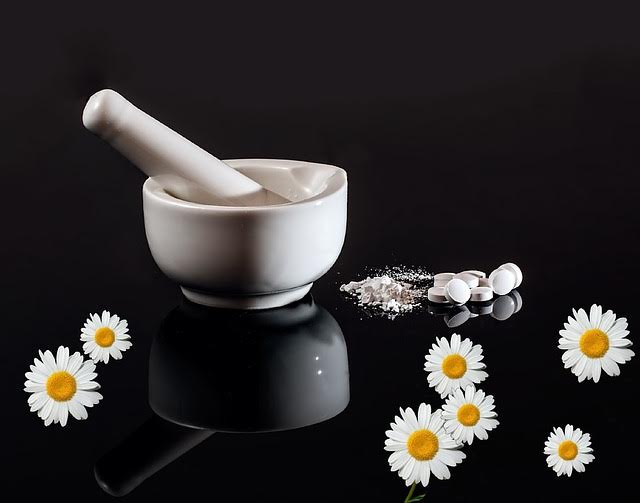
Fortify with supplements and amino acids well before you start your taper to be fully prepared. Taking the right amino acids in the right doses can make a world of difference during the tapering process. Also, as this is a time of stress on the body, a good multivitamin, extra vitamin D, fish oil and/or cod liver oil and probiotics are crucial. I also think turmeric is a great supplement for anyone dealing with depression because of its potent anti-inflammatory properties.
Not following the proper protocol could mean ending up right back where you started because your brain needs LOTS of time, healing and patience to repair what the drug has done to it. Take the precautions seriously and do it right the first time.
Energy work can help minimize symptoms and support the healing process to make it easier and more successful. It can improve your health and life overall and for some can heal depression if the root is from an emotional or energetic cause. Getting off antidepressants can be a sensitive process and it can help to allow yourself to process what you are experiencing.

Depression is curable. TJ’s site is an amazing resource that I recommend to people who are looking for ways to heal depression. It’s just a matter of taking action, finding the source of your symptoms and applying what you have learned. I realize that this is no small feat when you are depressed…everything feels overwhelming…but just reach out and I am here for you.
Cari has her own site at CariOnPurpose.com where she shares about her healing journey if you want to get in touch with her.
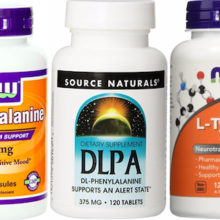
 Most people don’t realize that there are different kinds of depression and why 5-htp or phenylalanine could produce vastly different results for different people.
Most people don’t realize that there are different kinds of depression and why 5-htp or phenylalanine could produce vastly different results for different people.
When some people are depressed, they have really dark thoughts, become obsessive, and hate themselves.
Other people describe their depression in a very different way.
These people say they feel numb, like life has flatlined.
They have no motivation, don’t feel pleasure, don’t want to get out of bed, and life is sort of just “gray”.
L-phenylalanine or DLPA are amino acids that are used primarily to help people that have no motivation, feel numb, or sensitive.
Every amino acid can occur in two forms, except for glycine.
Your body primarily just uses l-amino acids, and that is why DLPA is unique as a supplement.
Taking DLPA will produce different effects and depending on what type of depression you have, you will most likely react better to one or the other.
L-phenylalanine can help increase your pleasure. It is needed to form endorphins and helps to produce PEA (phenylethylamine). It is found in protein such as animal proteins and fish.
It is also converted into tyrosine. Tyrosine goes on to produce neurotransmitters such as dopamine, epinephrine, and norepinephrine.
DPA is a bit rare and is the mirror image of l-phenylalanine. D-phenylalanine helps stop the enzymes that are responsible for breaking down endorphins so that the endorphins are allowed to build and expand.
L-phenylalanine can be great for people that are low in catecholamines such as dopamine and epinephrine and is a great alternative to tyrosine. A lot of people say that tyrosine makes them jittery or feel tense. L-phenylalanine also helps produce pleasurable feelings and motivation.
DLPA can be a better choice for someone that is overly emotional and sensitive, such as randomly crying for no apparent reason. DLPA can help boost endorphins more than just l-phenylalanine by itself.
DLPA would be a great choice if you need both energy and you want to increase your pain tolerance. DLPA is also a good choice for people that take l-phenylalanine and find that it gives them too much energy or gives them insomnia, as DLPA’s energy boost is more subtle.
Although a bit oversimplified, you can think of the d- form of phenylalanine as being more of the “painkiller” and the l- form of phenylalanine as being more of the “energizer”.
Phenylalanine side effects and DLPA side effects are very similar. If you have migraines or high blood pressure, be careful taking either supplement. Both DLPA and l-phenylalanine can cause migraines or slightly increase blood pressure.
Some common side effects include anxiety, jitteriness, or hyperactivity.
Rare side effects can include itching, mouth tingling, or swelling of the hands of the feet (these are rare).
Always take the smallest dose possible and then slowly increase it when you know that you react well to it.
If you are taking antidepressants, you need be especially careful while taking amino acids. You can read how to take amino acids while on antidepressants here.
L-phenylalanine and DLPA are best taken on an empty stomach and in the morning or early afternoon. If you take them too late in the day, it can cause insomnia.
Buy the smallest dose of l-phenylalanine or DLPA (depending on which one you expect to work better for you, see above) and take it in the morning without food. After 30 minutes, you should feel something. If you don’t, you can take another capsule until you reach the desired effect. If you feel negative effects, you can stop there.
Taking DLPA or l-phenylalanine can help raise endorphins and norepinephrine levels, which can take away some of depression’s effects on your mood and thoughts.
With either amino acid, you can take them for as long as you need them. The good thing about amino acids is that after you take them for a while, you won’t need to take them anymore. It is generally recommended that after you finish a bottle, try going a few days without it to see how you feel. If your mood drops significantly, resume using the amino acid until the next bottle is up, then you can see what happens when you stop taking it.
This is different than taking traditional medicine, which can cause withdrawals and dependence. It can be excruciatingly hard to get off antidepressants for example.
I have taken l-tyrosine, DLPA, and l-phenylalanine. I personally react better to l-phenylalanine. It gives me that sense of calm focus, the type of motivation where getting stuff done is pleasurable but you don’t feel all crazy at the same time.
L-tyrosine gave me inner tension and made me feel aggressive in an odd way. The only time that l-tyrosine worked for me was when two weeks before moving to Thailand after selling all my belongings and buying a one way ticket, I shut down from the stress. I used l-tyrosine to let me function and actually get up in the morning. Once the burnout started going away, it gave me the same high tension aggressiveness as it normally does.
DLPA made me feel different, but something was just a bit off.
L-phenylalanine made me more positive, more focused, had increased pleasure, and increased motivation.
There was a time when I actually used l-phenylalanine to keep going towards the end of the month when I was selling solar to hit my goal. I was starting to lose focus and used it the last weekend by taking one capsule, taking out just a little bit of the powder, and taking small doses throughout the morning and afternoon. I was the top direct salesperson for the entire country that month.
I don’t recommend using l-phenylalanine or DLPA to keep going when you need to rest, however, they should optimally be used to help you get back on track and function.
My experience also shows how important it is to realize that each person will react differently to amino acids. One person will do well with tyrosine, another person that experiences a lot of emotional sensitivity will love DLPA, and another person will like l-phenylalanine.
I personally would recommend that you try l-phenylalanine first, as it can produce more beneficial effects and is converted into l-tyrosine anyways. However, most resources and books say to try l-tyrosine first before trying l-phenylalanine or DLPA.
I always purchase supplements from Amazon or iHerb. I have used both NOW Foods and Source Naturals. Both are really inexpensive, with l-phenylalanine usually around $11 for a bottle and DLPA around just $9 for a bottle.
If you’ve ever taken any of these amino acids before, let us know in the comments what your experience was.
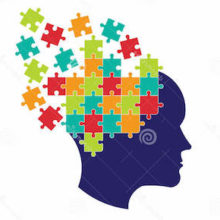
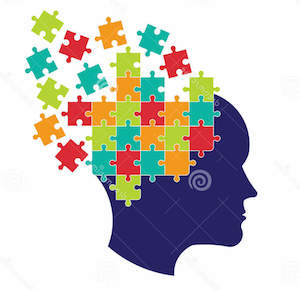 Your alarm goes off.
Your alarm goes off.
As you try to wake up, you can’t shake the feeling that the day is going to be hard.
Then the thoughts start coming in, like a river of self-hatred.
“Why can’t I beat this depression?”
“I’m worthless, everyone around me thinks I’m a drag.”
“What’s wrong with me?”
“If I was stronger I could just feel better.”
“Is this actually real or am I just imagining things?”
“Maybe I need to fix my thoughts. I just haven’t mastered changing my thoughts yet. Damn, there was another negative thought… Mentally I must be weak.”
“I’m a bad person.”
Notice a common theme here?
Tim comes over to pick you up in his run-down car.
As you get in, he tries to start it. All you hear is that quick clicking sound, signaling the battery might be dead.
All a sudden Tim hits the steering wheel and says, “Why can’t I just start this thing! What’s wrong with me!” You look over at him and you can see his self-esteem plummeting.
Finally the car starts, and as you are driving it hiccups, lunges forward, and every bump feels like you’re on a rollercoaster ride. Tim then starts assuring you, “Sorry, I’m such a horrible driver. I just can’t seem to drive straight at all.”
You look at him a little perplexed, wondering why he’s blaming himself for all this.
Seeing the look on your face, Tim says, “Sorry it’s hot in here, I suck at working the air conditioner. If I could just push the buttons right it would probably be cold in here.”
Then suddenly after 10 minutes the car dies in the middle of the road, and its hot outside. As you both get out of the car to check it out, instead of looking under the hood and diagnosing a mechanical issue, he proclaims, “Look, I’ve been trying to think positively about getting to our destination and failed! It’s all my fault. If I was just stronger we would have made it. I’m such a shitty and mentally weak person.”
Finally you look at him and slowly say, “Tim… What does this have to do with you? Don’t you just need to get your car fixed?”

It Would Be Hard To Get Anywhere In This Car
When you read the story about Tim and his car, what was your impression of him? Did you wonder why he was being so hard on himself, when all he needed to do was get a new battery, put coolant in his radiator, and fix his car’s suspension?
The problem with depression, is a lot of people just don’t understand what it actually is. Depression is the state you find yourself in when your brain and body aren’t functioning properly. Simply trying to think positive won’t work.
For most people, they use the word “depressed” when they are in reality just “sad”. That’s why they can go for a jog and the “depression” just goes away, and why they tell you to just snap out of it. For them, they actually can snap out of it, because it is just sadness.
This becomes dangerous when you start to believe the same thing and you are actually depressed. When you believe that the depression itself means there is something wrong with you, that you should be able to shake it off, and just keep going, is when you get trapped in a downward spiral of despair.
The key is to realize that depression isn’t “you” and it doesn’t mean you are in anyway a bad human being. It doesn’t mean that you are mentally weak and you just haven’t had the strength to fix your thoughts. That’s like telling Tim he’s a bad person and to just think positive and his car should run better. It won’t run better until he fixes the root causes of what’s wrong with it mechanically in the first place.
There is absolutely nothing wrong with you if you are experiencing depression. Something is just off.
The depression isn’t you. There is a root cause. Something happened physiologically and it is now affecting your mental state, like your body is sounding off an alarm.
This alarm could be that you’ve been working 18 hours a day for too long and now your cortisol can’t keep pushing you forward. This alarm could be that you’re deficient in magnesium, need more vitamin d, and are allergic to gluten and you eat bread every morning for breakfast.
When you are bombarded by these negative, maybe even suicidal thoughts, realize that these are not your thoughts, there is something going on chemically that is producing those thoughts.
Once you are able to separate yourself, accept yourself exactly as you are, and see that a fact is a fact, that something is run down and needs fixing, then you can get rid of all the stress of beating yourself up.
This correct perspective allows you to deal with the depression without being overwhelmed.
Now that you know that depression isn’t you, it’s time to actually fix it. It’s time to actually take the car to the shop and replace some parts and change some oil.
There’s a fine line between acknowledging that depression isn’t your fault and being a victim.
You don’t want to sit back, accept that it isn’t your fault, and do nothing about it.
You also don’t want to hope that someday someone will magically fix it for you.
Nobody is coming to save you.
People can give you directions and guide you, but you have to actually do it. Tim has to get out his tools and go under his car and start troubleshooting what’s wrong with his vehicle.
You have to take an active role in doing whatever it takes to fix your depression. You have to accept that yes, being depressed means nothing about who I am or what I am capable of, but I do have to do whatever it takes to fix it now.
The reason I was able to fix my depression is I made a commitment that I would do whatever it takes to fix it no matter what.
This meant I could now read any book. My mind was open to any approach. I realized that I should place value on investing my money into getting tests done, seeing the right people and paying for their time, buying healthy food and trying out different supplements, and going at it until the problem was fixed.
I had to look under the hood, try out different things and keep going, until I figured out what was wrong and what could fix it, until the engine started firing on all cylinders.
That same year that I made that decision to do whatever it takes was the same year that I started to finally glimpse what life was like on the other side, of not being depressed and wanting to blow my head off every single day, and what mental clarity was like after living with brain fog for so long. I was able to get off Celexa and learned how to properly get off of antidepressants.
Every car is different, just like every person is different. There can’t be any one single supplement that cures everyone, because depression is caused by so many different things. You have to find out what your own root causes are. There are a thousand different reasons why a car won’t start, you just have to figure out which ones are causing your car not to start.
The depression was never actually “me”. My body was just out of balance. I was trying to force a run down car to drive somewhere, and I never stopped to realize maybe the car just had some broken parts.
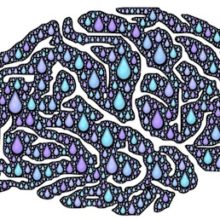
One of the most common questions I am asked is if you can take amino acids while on antidepressants or while weaning off of them.
The answer is, yes, but with caution.
Amino acids can be used to either enhance the performance of an antidepressant or to help you get off antidepressants without going through extreme withdrawals.
Before we begin, you might be wondering why I’m asked about this so often.
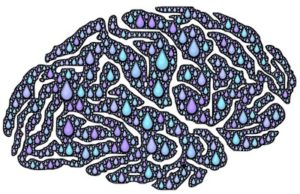 If you’re reading this, you are probably like most people who went to the doctor, complained about depression, and was given a prescription for a medication to fix your problems at one point.
If you’re reading this, you are probably like most people who went to the doctor, complained about depression, and was given a prescription for a medication to fix your problems at one point.
Most people that find my site search in Google to learn about how to deal with the negative effects they are experiencing taking an antidepressant. Antidepressants can be hard to withdraw from, and a lot of times people still feel depressed or anxious while on them.
Interestingly enough, while SSRI’s and antidepressants are powerful, they usually never completely fix the problem for people or they only help people for a short duration of time.
The most common type of antidepressant, SSRIs, prevent serotonin from going into reuptake mode. This means that you don’t actually have more serotonin, you are just using the small amount more.
The problem with this is that that small amount of serotonin can no longer be converted into melatonin or 5-HIAA.
According to the book The Mood Cure by Julia Ross, 5-HIAA may be just as important as serotonin for your well-being! Studies have been done that have shown that reduced levels of 5-HIAA have resulted in destructive moods, violent crime, suicide, insomnia, and addiction.
Most people that struggle with mood problems have both low serotonin and 5-HIAA. Antidepressants often act as a band-aid, and don’t fix the problem.
Not only that, according to physicians writing for the New England Journal of Medicine, “51% of approved drugs have serious side effects not detected prior to approval.”
I believe that antidepressants should be a last resort, rather than the first option, for these reasons.
However, if you are taking an antidepressant, you can either take amino acids while continuing your antidepressant, or you can use amino acids to wean off of your antidepressant (which is more common).
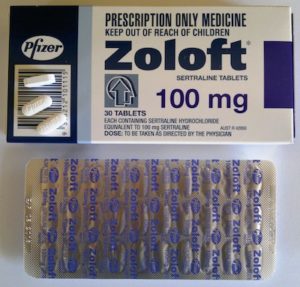
Most people are looking to wean off their antidepressant. However, many people use amino acids to enhance their current medication’s effects.
In a British study that looked at severely depressed patients on an SSRI called Serzone, when people took tryptophan with Serzone their depressive symptoms dropped more than 50 percent.
5-htp and l-tryptophan are amino acids that aid in the production of serotonin. If you are taking an SSRI (see table below for common antidepressants and their function) then these two amino acids can help you actually produce more serotonin and have it work better.
L-tyrosine is an amino acid that helps produce more catecholamines. Some people that take SSRIs complain of side effects such as being tired, low sex drive, low motivation, etc. This is because SSRIs can deplete the levels of catecholamines. L-tyrosine can help eliminate some of those side effects.
If you decide to take amino acids while on antidepressants, make sure that you take the smallest dose possible to see if there are any negative effects first before increasing the dosage. That way you can catch any bad interactions early and not suffer from negative side effects.
When you take amino acids and antidepressants at the same time, aim to take them 6 hours apart so they can work individually. When you take amino acids, also make sure that you take them on an empty stomach, otherwise they won’t work because they will be competing with all the other amino acids you take into your body when you eat protein.
Before you begin the process of weaning off an antidepressant, make sure that now is the right time for you.
In my popular post, How To Get Off Antidepressants Without Going Insane, I talk about how I waited until I didn’t have as much stress and responsibility in my daily life to start weaning off just in case I experienced bad side effects. This way my life wasn’t negatively impacted and I didn’t have to worry about performing in too many roles.
Always take the smallest dose possible while you are experimenting with amino acids while on antidepressants to make sure you don’t experience any negative effects.
Buy the smallest dosage of the amino acid you can find. For example, 5-htp has many different dosages, but you can find it in a 50mg dosage. Then you can take that capsule and only take half.
Once you’ve done that successfully and everything went well, then you can take the full 50mg capsule. If that is OK, you can increase your dosage until you find that it is working well for you and stop there.
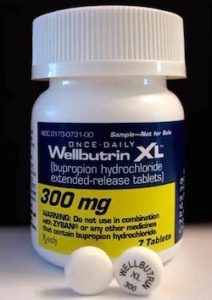 SSRIs affect serotonin levels. If you take an SSRI, you will want to take either 5-HTP or tryptophan.
SSRIs affect serotonin levels. If you take an SSRI, you will want to take either 5-HTP or tryptophan.
If you take atypical antidepressants or SNRIs, you will want to take either tyrosine, DLPA, or l-phenylalanine along with 5-HTP or Tryptophan if needed. SNRIs and some atypical antidepressants (like Wellbutrin) affect the brain’s norepinephrine levels. Tyrosine or DLPA with 5-HTP or Tryptophan can help restore these neurotransmitters back to healthy levels.
Common SSRIs include:
Common SNRIs include:
Atypical Antidepressants include:
For example, if you were trying to get off Celexa, you could first try a low dose of 5-htp and see how it affects you. If you get positive results, you can increase your dosage to the desired amount. If you take 5-htp and it doesn’t work very well, you can try l-tryptophan at a low dosage and see how that works.
Ideally take one of those twice per day, such as around 5:00 P.M. and before bed. If everything is going smoothly, begin to slowly taper off your antidepressant. While tapering off, you may find you need to take more of the amino acid to reduce the withdrawal symptoms, always being careful about how much you are taking and asking yourself if there are any negative effects.
Then once you’re off the antidepressant, you can keep taking the amino acid for a few months until you no longer need it, and use the foundation of beating depression naturally with food and nutrition to keep your moods stable and happy.
If you are taking an SNRI, you can use an amino acid to boost serotonin and an amino acid to boost catecholamines. Again, 5-htp and l-tryptophan boost serotonin while amino acids like l-tyrosine, DLPA, and l-phenylalanine boost catecholamines.
If you are trying to wean off of benzodiazepine or anxiety drugs like Klonopin, you can use specific nutrients for extra support such as GABA, taurine, inositol, and glycine to help your body naturally produce more of the calming neurotransmitters.
The most important part of the process is to go slow and use the smallest dose possible. Gauge the effects, and either switch strategies or increase your dosage if everything is going well.
Getting off an antidepressant can be a hard process, and I personally wouldn’t have been able to do it without using amino acids and nutrition to help me.
Comment below if you have any questions or want to share your journey.
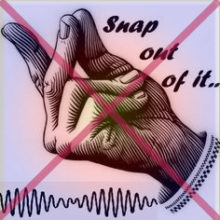
There is a problem with depression.
Most people don’t understand what it actually is.
Which leads to all sorts of communication problems and frustrations.
It also means when people are low they feel like they can’t reach out for fear of being turned down.
Watch this video and read the article to learn how to never hear phrases like “just snap out of it” again.
Have you ever been told to “just snap out of it” one too many times and almost went insane from it?
Or maybe you weren’t told to “just snap out of it” but instead were slapped in the face with one of its friendly cousins.
The “Instant Relief” Versions:
The “Spiritual” Versions:
The “Compare Yourself” Versions:
The “It’s In Your Head” Versions:
The “Random Acceptance” Versions:
It’s one of the most annoying things to hear others tell you to just snap out of it and think positive when all you want to do is blow your head off, but we also have to understand why they say that.
The average person, especially someone that has never experienced depression, has no idea what is going on when you tell them things like, “I feel horrible and just want to die. My life sucks. I don’t see the point in going on.”
For a person that is simply “down” or “sad” all they actually have to do is go for a run and spend half a day shaking it off and they feel better! To them, a small feeling of sadness is on the same playing field as full blown depression. They have just never actually crossed into the territory of real depression, so they have no real understanding of what you are experiencing.
Once you understand where they are coming from, you can begin to form the bridge of understanding to your situation.
I came up with this analogy years ago and it has yet to fail me once in helping someone else understand what I meant when I was depressed and couldn’t just do a few jumping jacks and feel better.
Depression is a physiological state that you are in and cannot get out of.
The best way to describe it is to tell the person to imagine that they just drank a massive quantify of alcohol. Choose their favorite drink and choose a quantity that would put them on their butt in a state of drunkenness. I wouldn’t recommend it, but if you really wanted to ensure they understand, feel free to get them drunk for the analogy (just kidding, but I guarantee you that would work).
Now ask them, if they were in that state of being drunk, and right in the middle of it you looked at them and said, “Okay! Now just ‘think’ sober thoughts and snap out of it! Be sober! Right now!” what would they say to you?
Exactly.
They would say there is nothing they can do in that moment to just stop being drunk.
The bridge of understanding has been formed.
This was one of the biggest turning points for me when I realized that trying to use positive thinking was actually making me worse.
Let the person know that just like being drunk from alcohol, being in a depressed state simply means something is off and you are stuck there until you get everything working correctly.
No matter how much snapping, mini trampoline jumping, shaking your body off, growing up, or comparing yourself to impoverished nations you do, that won’t correct a vitamin deficiency. No matter how many blessings your count, that won’t get rid of a hormonal imbalance.
An even better way to deal with someone telling you to “just snap out of it” is to never hear them say that in the first place.
We also have to realize and accept that a lot people respond the way they do is because we don’t tell them about our problems properly.
Remember, people don’t understand what depression really is. It is our job to communicate to them properly so that they can actually help us.
Instead of expressing yourself generically, try actually saying what you need in that moment.
Instead of, “I feel like killing myself,” which someone who doesn’t understand depression has no idea how to respond to, tell your friend, “I feel out of control right now and just need someone to just talk to and give me the push to find solutions. I don’t need advice or any words of wisdom, just someone to talk to and hear me out. Is that okay?”
Do you see the difference?
Instead of, “Life sucks, I don’t think I’ll ever get better, I don’t know what to do, I just hate myself,” tell your friend, “Right now, advice or words of encouragement won’t help me. I feel like I am trapped and losing hope in ever feeling better. I just need someone to remind me of who I am and go out and get something to eat or do. Are you free later today to do something for an hour? If not, no worries.”
The friend that heard the first phrase has no idea what to do. He or she feels uncomfortable, wants to help, but gets frustrated that they can’t do anything either, and just tells you, “Look, you gotta just shake it off! Go for a run and you’ll feel better.”
The friend that hears the second, clear version will know exactly what they can do to help you.
You’ll be surprised at the responses you start to get when you know how to talk to people about how you feel and what you need, and you’ll also be surprised at how powerful it is to set up the conversation that way.
You might find yourself actually getting what you need, and never having to hear “just snap out of it” again.
Afterwards, get out there and start figuring out what your root causes are so you can actually feel better to the point where you only have “sad” days and can go out and shake the sadness off.

Can standing in a cold chamber full of nitrogen make you feel better?
It’s one of those things that sounds like a new fad at first, but you never know until you experience it for yourself.
Cryotherapy has started to take off. Major sports teams like the Dallas Mavericks have been using it to improve athletic performance for many years now.
I decided to try it myself to see what it was really about.
Inflammation is part of the the body’s immune response when it is protecting itself from harmful conditions.
If you have chronic inflammation, you will likely experience anger, aggressive behavior, inner tension, or constantly feel bad. Your body is responding to a perceived threat. If there is no actual threat, the white blood cells can start attacking healthy organs or cells.
The chemical signals released by these attacked cells can cause a wide range of problems and pain. Cryotherapy’s main objective is to reduce inflammation.
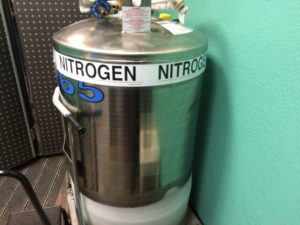 Cryotherapy is where you stand in a tank filled with liquid nitrogen-cooled air that goes to around -130°C (-266°F) for 2-3 minutes. Cryotherapy helps reverse the effect of inflammation by constricting the blood vessels. It is similar to using an ice pack on an injury, except this time your whole body is in an ice pack, which causes a whole lot of other cool things to happen (no pun intended).
Cryotherapy is where you stand in a tank filled with liquid nitrogen-cooled air that goes to around -130°C (-266°F) for 2-3 minutes. Cryotherapy helps reverse the effect of inflammation by constricting the blood vessels. It is similar to using an ice pack on an injury, except this time your whole body is in an ice pack, which causes a whole lot of other cool things to happen (no pun intended).
Short bursts of cold can even help increase the antioxidants glutathione and superoxide dismutase, which can improve overall day-to-day functioning.
Since you are on this site, you’re probably looking at ways to feel better, especially mentally. Chronic inflammation can be caused by multiple factors, such as pollution or poor diet, and some people have even gone as far as to say that depression is really just a symptom of inflammation.
A large body of research now suggests that depression is often associated with a low-grade, chronic inflammatory response and is accompanied by increased oxidative stress.
Like we talked about earlier, inflammation can cause a whole host of problems, such as reduced appetite, pain, and even making it harder to sleep.
 In 2015, there was a study conducted that found that people with depression had 30% more inflammation in their brain than those that didn’t have depression.
In 2015, there was a study conducted that found that people with depression had 30% more inflammation in their brain than those that didn’t have depression.
One study conducted found that depression is often present in inflammatory illnesses, and even 1/4 of people who take interferon, a medication for hepatitis C that can cause inflammation, develop major depression.
It turns out that inflammation produces cytokines which cause neurological symptoms just like depression does.
Antidepressants have been shown to reduce these cytokines and this can explain why some people see a big difference when they take them.
However, make sure to read all the comments in my article about getting off antidepressants and my experience taking Celexa before opting for the band-aid solution that antidepressants often are.
Cryotherapy produces a lot of endorphins after you get out due to the body reacting to the stress of being cold. Anxiety and depression are often two sides of the same coin, and the same beneficial effects we get with reducing inflammation affect anxiety as well.
If you have ever felt anxious and noticed your anxiety went away or was reduced after going for a hard run or after lifting weights in the gym, stepping out of a cryotherapy tank can feel the same way.
After going through a lot of stress with a new job and dealing with chronic health issues, I got to the point where my cortisol was off and inflammation was high in my body. I was having a hard time sleeping and would get pain behind my eyes, joint pain, headaches, etc. from eating food and daily stressors.
A doctor told me that if I didn’t slow down and heal myself, my adrenal glands could get really messed up and leave me with long-term problems.
I put on the brakes for a few months with work and at at the same time I heard about cryotherapy from my manager.
Like anything, it’s better to just try it and see what happens instead of thinking about it forever. So I did. The first time I went in I left feeling great and I slept better that night.
I then went to around 6-8 different places to do their introductory sessions and see who was the best.
Different locations left me with different experiences. One thing I found surprising was that some of the tanks I got in didn’t even feel cold, and only a few of them I left feeling really cold.
I could tell a cryotherapy tank was cold when my stomach area felt different afterwards, like a warming up feeling internally. That was most likely due to my blood flowing to my organs, which means the cryotherapy accomplished what it was meant to accomplish.
Another factor that people don’t mention is the staff. Someone always comes in with you to monitor that you don’t look down, breathe in a bunch of nitrogen, and pass out. Some places were really awkward and I dreaded going in and having to force a conversation with a staff member that clearly didn’t care about anything I said. Other places were laid back and easy, which made it easier to want to go in and do the session.
I found one with cold tanks and great staff and signed up for a monthly membership which was $175 per month. I lived in Dallas, and I have learned that cryotherapy is cheaper in Dallas-Fort Worth than most places. Going every single day was equivalent to paying about $5-$7 per session. When it comes to health and improving your quality of life, it’s important to invest in your self and not be cheap. What’s the point of life if you feel like shit all the time?
I went everyday for 3 months and noticed a big improvement in my overall well-being. They say that you don’t build a tolerance to it, but I did notice that I didn’t get as cold after a while and didn’t feel the effects as strongly. When I wouldn’t go for a while and return, I would get the warm feeling in my belly again and leave feeling energized and alive.

Some Locations Have a Wide Range Of Slippers to Choose From
I’m not sure, but you will never know unless you try it.
Most places allow you to pay $10-$20 to try it out one time and see.
You’ll either lose $20 in the journey to healing yourself and learn that it doesn’t work, or you’ll find something that helps you heal and fix your depression.
Cryotherapy is interesting because it looks like it is going to be unbearably cold and painful, but taking a cold shower is harder than doing cryotherapy.
Like I mentioned earlier, just make sure you are using a good facility. You might have to try a few places before deciding whether or not cryotherapy works for you.
After you hop out, write us a comment below and let us know how it went, as long as your fingers aren’t too cold to type :).

The following is a guest post by Jenny.
She is proof that it doesn’t matter how long you’ve struggled, if you’ve had alcohol or drug problems in the past, if you had a rough time growing up, etc.
I love success stories because by definition, depression makes your brain think that you can’t beat it and that nobody ever does. We see all the bad stories but never see the countless people that overcame depression.
From a young age I’ve always felt overwhelmed by my feelings, unable to process them in the same way others seemed to do. Dark thoughts, constant negative self talk, that voice always telling me I’m not good enough. I would question everyone’s motives and intentions believing that people were out to harm me, always feeling as if I’m fighting a battle, every single day.
I had a lack of energy and motivation as well as the hopelessness that things would never change. I would isolate myself, not be able to stand people physically being near me when I was at my worst and it’s something that’s made it very difficult for the people around me, especially those closest and as a result my relationships have suffered over the years.
I’m 41 now and have fought, resisted, battled, questioned my ability to cope with life, how I’ve always reacted negatively to life since my very early teens. Back then it was dismissed as is in a lot of cases as teenage angst etc except it never really left me. I had a difficult relationship with my father and for many years I was the ‘victim’ of a troubled childhood and that was something I used in turn as a reason or excuse for how I behaved. My father was physically abusive towards me and we would clash, often violently and this pattern continued right up to 21 years of age, yet I had two older siblings and their experience wasn’t anywhere like my own.
I became familiar with self-harm in my teens right up to 31/32 years of age when I severed the artery in my right hand. I had multiple suicide attempts which with hindsight were desperate cries for help because I didn’t understand why I was so different to everyone else, or so I thought.
I was and still am to some extent reclusive, I struggle in other people’s company yet I can get on with almost anyone and few people would really know what it takes for me to make the effort to engage with them. it was in my teens I discovered alcohol, drugs never really interested me as they were for really messed up people I thought. Anyway, it took twenty odd years of drinking before I admitted finally I am an alcoholic and that’s okay today, I’m six 1/2 years sober.
In that time I held down jobs, lost them, never had an adult relationship except occasionally with married men as I was too messed up to let anyone close enough, I got pregnant at 23 and my daughter is now 17. Through all this I saw various counsellors, tried numerous therapies in fact we got to the point where the professionals concluded I could probably teach them a thing or two and talking never really proved a practical enough solution to me. Medication didn’t really help, it never did, I was ‘resistant’ to it so what was left?
I clearly had dual diagnosis of depression and alcoholism and my mental health tag has changed a few times over the years but it was 18 months ago when I was left with nowhere else to go I couldn’t tolerate medication at all, less so since becoming sober, I didn’t want to go back to drink because I knew with absolute certainty there would be no coming back again.
Still struggling with the death of my beloved mum nearly 12 months before, whom my daughter and I had always lived with and I had cared for during serious, eventual terminal illness the previous five years, this was the one woman who had never given up on me, had in fact been the only reason my daughter hadn’t been removed from my care.
I was also looking at the end of my relationship with my partner, the only person in my life I’d ever let so close, who’d supported me during my mum’s final month’s/days/hours but my behaviour had become uncontrollable, unmanageable and he couldn’t stand it anymore.
I couldn’t blame him either, plus he lost his own dad a few weeks later. So in what seemed like a very deep hole with no way out one night, like many others I was searching the internet in the hope of answers, breaking my heart at suicide sites for those poor people and their stories, even whilst thinking I couldn’t stand it anymore myself, silently cheering them on to live, surely there had to be something to grab hold of?
I came across Dominate Depression that suggested something called amino acid therapy, I’d never heard of it before, ever and I’d become a bit of a fitness buff (I’d lost six stone and got quite physically fit but neither did that answer the problems in my head). By this point I was ready to try anything there really wasn’t much left for me and as much as I love my daughter I was literally fighting to stay alive for her.
I slowly started buying some of the suggested supplements and I really appreciated the honest and informed account. Something about it resonated with me and I’m so glad it did. Sadly the solution didn’t come in time to save my relationship, too much damage had already been done but I survived.
Finding the website that night I was at my lowest point in years, dark didn’t even come close to the hole I felt I was in and I wasn’t even sure that I wanted to get out anymore. The emotional pain had become physical, everything hurt and I just couldn’t seem to find anyway of making it better. The fact I had yet again gone to my GP to try antidepressants which only made things worse made me question if there was anything that could make a difference. You trust your doctor, when they can no longer help you kind of think that’s it. I have a diagnosis of PTSD and the last antidepressants that tried left me awake all night and hallucinating, what with the struggle I have with night terrors already I was absolutely terrified.
The concept of amino acid therapy in the beginning at least gave me something to hold onto, a hope that there was something else I could try and that wouldn’t have the horrific side effects of antidepressant medication. I won’t say it’s a miracle cure, I’ve been doing it for about 8 or 9 months now but the difference is marked and I would state with certainty I wouldn’t be in as good a shape as I am today without it.
For the first time in my life I’m coping with life without medicating with alcohol, painkillers (prescription AND over the counter) or antidepressants that either wipe me out or make me feel worse. I will not pretend that all in the garden is rosy but that’s life and there is a way of helping yourself when nothing else seems to work, or when professionals don’t know what box to put you in and just leave you to either get better or die, stark but true sometimes.
I try various aminos which I’ve researched and used a number of books and this site to help inform me, if you can afford to seek professional guidance I would say that’s a start.
These days I’m back at college, with a brilliant group of people studying towards a career in support work which I also volunteer in. I was also lucky enough to be asked to do some work for a body that inspects medical and health facilities, providing official reports to the government, so I like to think I’m also helping patients like myself too.
My relationship with my daughter is much improved and she is someone I’m incredibly proud of, my mum is still gone, as is my partner but I’m still here.
Regards,
Jenny

I was interviewed by Jennifer who recorded conversations with multiple health experts for her Health and Happiness Movement.
We talked about how a healthy body will produce a healthy mind (most people only focus on the reverse), how to beat depression without medication, and also what depression was like for me as a teenager.
If you have listened to my interviews before, a lot of this will be familiar. However, I haven’t shared what my experience was like as a teenager too often.
Listen in to learn more about how to beat depression without medication and if you want to get perspective on how to help your child or understand what a younger adult experiences while suffering from depression.